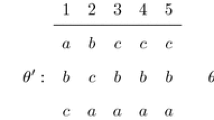Abstract
A choice function over opportunity sets is justifiable if there exists a choice function over alternatives such that an opportunity set (menu) is chosen from a collection of menus if and only if the former contains alternatives which reach the highest instrumentalist value, in terms of the choice function over alternatives, of all menus combined. This article explores necessary and sufficient conditions for justifiable choice function by general choice function, Chernoff consistent choice function, and path-independent choice function. This article also considers the condition under which the underlying choice function is binary, which leads to characterizations for binary-justifiability by acyclic, quasi-transitive, and transitive preferences.
Similar content being viewed by others
Notes
All choice consistent conditions are introduced in terms of \(c\), but also applies to \(c^{*}\).
The discussion of this paragraph is based on the observation of an anonymous referee.
This condition is slightly different from Ryan’s (2014) original condition in that the original one does not include \({\setminus } \{A\}\). It is observable that the original condition implies C. To preserve axiom independence, we modify the original condition to its current form. More importantly, our condition R has no essential effect on doubleton sets, whereas all other conditions work exclusively on doubleton sets, which makes the role of condition R clearer. Nevertheless, at the presence of C and WCM, which are assumed throughout this article, our condition R is equivalent to the original condition used by Ryan (2014).
The introduction of SE and Proposition 5 are both based on the observation of an anonymous referee.
BJC* is introduced by an anonymous referee.
References
Arrow KJ (1959) Rational choice functions and orderings. Economica 26(2):121–127
Blair DH, Bordes G, Kelly JS, Suzumura K (1976) Impossibility theorems without collective rationality. J Econ Theory 13(3):361–379
Bossert W, Suzumura K (2009) External norms and rationality of choice. Econ Philos 25(2):139–152
Bossert W, Suzumura K (2011) Rationality, external norms, and the epistemic value of menus. Soc Choice Welf 37(4):729–741
Chernoff H (1954) Rational selection of decision functions. Econometrica 22(4):422–443
Dowding K, Van Hees M (2009) Freedom of choice. In: Puppe C, Anand P, Pattanaik P (eds) Handbook of rational and social choice. Oxford University Press, Oxford, pp 374–392
Kreps DM (1979) A representation theorem for “preference for flexibility”. Econometrica 47(3):565–577
Kreps DM (1988) Notes on the theory of choice, vol 2. Westview Press, Boulder
Lahiri S (2003) Justifiable preferences over opportunity sets. Soc Choice Welf 21(1):117–129
Luce R, Raiffa H (1957) Games and decisions. Wiley, New York
Plott CR (1973) Path independence, rationality, and social choice. Econometrica 41(6):1075–1091
Quinn WS (1990) The puzzle of the self-torturer. Philos Stud 59(1):79–90
Richter MK (1971) Rational choice. In: Chipman JS, Hurwicz L, Richter MK, Sonnenschein HF (eds) Preferences, utility, and demand. Harcourt Brace Jovanovich, New York, pp 29–58
Ryan M (2014) Path independent choice and the ranking of opportunity sets. Soc Choice Welf 42(1):193–213
Sen AK (1993) Internal consistency of choice. Econometrica 61(3):495–521
Author information
Authors and Affiliations
Corresponding author
Rights and permissions
About this article
Cite this article
Qin, D. On justifiable choice functions over opportunity sets. Soc Choice Welf 45, 269–285 (2015). https://doi.org/10.1007/s00355-015-0890-7
Received:
Accepted:
Published:
Issue Date:
DOI: https://doi.org/10.1007/s00355-015-0890-7




